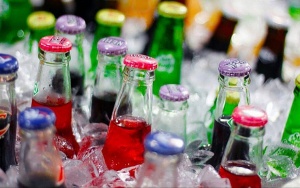Valuable lessons can direct sugary beverage rules
SSBs are among the leading sources of free sugar intake in many countries, while offering little-to-no added nutritional value. The increased intake of SSBs is associated with increased risk of excess weight and obesity, and adverse health outcomes including type-2 diabetes, cardiovascular disease, dental caries, and osteoporosis.
 |
| Dr. Nguyen Thi An, Country director, Vietnam office HealthBridge Foundation of Canada |
At present, SSB tax policy is an effective financial measure for governments in any country where rates of obesity, diabetes, and heart disease have increased. Empirical evidence shows that SSB taxes are an effective intervention to increase prices and reduce sales of SSBs, and can assist reductions in free sugar intake through reducing the consumption of SSBs.
The World Health Organization (WHO) recommends taxing SSBs as part of the updated menu of cost-effective and evidence-based policies in the WHO Global Action Plan for the Prevention and Control of NCDs 2013-2030. They represent a win-win-win strategy: a win for public health (and averted healthcare costs), a win for government revenue, and a win for health equity.
The important role of SSB tax policy is also well received by the Vietnamese government. It is proven by the fact that, for the first time ever and as defined according to national standards, water-based beverages with sugar content over 5g/100ml have been added to the list of taxable items in the draft Excise Tax Law revision.
On June 8, the National Assembly approved a resolution on the 2025 Law and Ordinance Development Programme, and adjustments to the 2024 programme. The excise tax law revision is included in the 2024 programme, with a timeline of first hearing in October 2024 and passage in May 2025.
If the SSB tax is applied, public health is improved, healthcare costs for NCDs related diseases are reduced, labour productivity loss in the long term is also reduced, and government revenue is generated and increased. In turn, this revenue can be funded various goods, programmes, and services to support Vietnam’s public healthcare.
There is a rapid increase in overweight and obesity, as well the rapid increase in SSB consumption in Vietnam. The prevalence of overweight and obesity in children has doubled over the past 10 years. It is significantly high in urban areas at 26.8 per cent, followed by 18.3 per cent in rural areas and 6.9 per cent in mountainous areas, and is rapidly increasing, especially in urban areas.
According to the World Bank Global SSB Tax Database, as of August 2023 there were 117 countries applying taxes on SSBs, which will likely increase. Through our analysis of countries when SSB taxes have been enacted, we have learnt many valuable lessons.
A study of low, medium, and high SSB consumers in South Africa found that the tax led to reduced consumption of SSBs among all participants in the year following implementation. Elsewhere, two years following the implementation of Thailand’s sugar content-based SSB tax of 14 per cent, average daily SSB consumption declined by 2.8 per cent. Consumption of carbonated beverages decreased the most, with a 17.7 per cent reduction in average daily consumption.
A 2018 study estimated that SSB consumption in Mexico led to a productivity loss of $1.4 billion. More than half of this productivity loss is due to premature death (from diet-related diseases).
The average cost to the United States healthcare system of treating issues linked to SSB consumption is around 10 cents per 12-oz soft drink.
A study in Australia projected that a 20 per cent tax on SSBs would improve health outcomes and reduce healthcare costs by $329 million, and provide productivity gains in the paid and unpaid sectors of $906 million of the economy.
A study modelling the impact of a 20 per cent SSB tax in South Africa estimated the tax may avert 72,000 premature deaths and save over $330 million in healthcare costs over 20 years.
SSB taxes also lead to greater sales of untaxed, healthier beverages. This offsets reductions in SSB revenues. Multiple geographies with SSB taxes have seen increases in total beverage sales and revenues for beverage manufacturers, despite decreases in SSB sales.
After implementation of an SSB tax in France, revenues for beverage manufacturers increased despite a decline in SSB consumption.
Mexico’s SSB tax raised purchases of untaxed beverages by 4 per cent, primarily driven by increased purchases of bottled water. Mexico’s SSB tax also led to an 11 per cent rise in the purchase of healthier beverages (almost entirely bottled water) among high SSB purchasers.
In the year following implementation of Berkeley’s SSB tax in the United States, the sales of plain water increased by 15.6 per cent. Meanwhile, a study on the impact of a set of Chilean laws that produced a 24.7 per cent reduction in SSB purchases found no reduction in employment or wages paid to manufacturers.
Business simply cannot be a bystander in a system that gives it life in the first place, but should be in the proactive position of contributing to the improvement of public health through production of healthy and healthier food and beverage products. Companies should also join with governments to support the development and implementation of SSB tax policy.
 | MoF proposes a 10 per cent special consumption tax on sugary drinks The Ministry of Finance (MoF) has maintained its view that sugary drinks should be subject to a special consumption tax (SCT) of 10 per cent in a message sent to the government regarding the draft revised SCT Law. |
 | Gains outweigh losses with sugar-sweetened beverage tax Taxing sugar-sweetened beverages is attracting great attention in Vietnam, with different ideas about the pros and cons. Dr. Angela Pratt, World Health Organization representative in Vietnam, talked to VIR’s Bich Thuy about lessons that can be taken from other countries. |
What the stars mean:
★ Poor ★ ★ Promising ★★★ Good ★★★★ Very good ★★★★★ Exceptional
Related Contents
Latest News
More News
- Citi economists project robust Vietnam economic growth in 2026 (February 14, 2026 | 18:00)
- Sustaining high growth must be balanced in stable manner (February 14, 2026 | 09:00)
- From 5G to 6G: how AI is shaping Vietnam’s path to digital leadership (February 13, 2026 | 10:59)
- Cooperation must align with Vietnam’s long-term ambitions (February 13, 2026 | 09:00)
- Need-to-know aspects ahead of AI law (February 13, 2026 | 08:00)
- Legalities to early operations for Vietnam’s IFC (February 11, 2026 | 12:17)
- Foreign-language trademarks gain traction in Vietnam (February 06, 2026 | 09:26)
- Offshore structuring and the Singapore holding route (February 02, 2026 | 10:39)
- Vietnam enters new development era: Russian scholar (January 25, 2026 | 10:08)
- 14th National Party Congress marks new era, expands Vietnam’s global role: Australian scholar (January 25, 2026 | 09:54)

 Tag:
Tag:



















 Mobile Version
Mobile Version